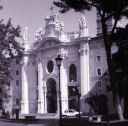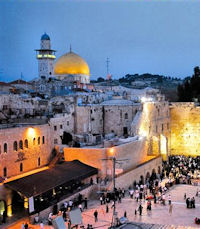» Enjoy our Liturgical Seasons series of e-books!
"There shall come forth a shoot from the stump or Jesse, and a branch shall grow out of his roots. And the Spirit of the Lord shall rest upon him, the spirit of wisdom and understanding, the spirit of counsel and might, the spirit of knowledge and the fear of the Lord."
Sunday Readings
The first reading is taken from the book of Isaiah 40:1-5, 9-11. These words of consolation and comfort were spoken to the Jewish exiles in Babylon. The end of their exile was near. The people would be brought back to Judea and Jerusalem by the power of God. Following the New Testament writers, the Church has seen in these words of the prophet much more than the liberation of the Babylonian exiles, namely, the true and final liberation of all mankind, brought about by the coming of the Son of God as Messiah and Redeemer.
The second reading is from the second Letter of St. Peter 3:8-14. The twofold purpose of this letter is to warn against false teachers and to dispel some anxiety the Christians of that day felt because of the apparent delay of Christ's second coming as Judge.
The Gospel is from Mark 1:1-8. "The beginning of the gospel of Jesus Christ, the Son of God." In twelve words St. Mark sums up the initiation of the greatest event that ever occurred in our human history, an event whose culmination would be not on earth but in heaven. God fulfilled the plan he had for us when creation began. He raised us up to the dignity of divine sonship by the incarnation. The eternal Son of God "humbled himself" and joined our human nature to his divinity, thus making us his brothers and capable of sharing with him the eternal kingdom of his Father.
Mark's story was, in fact, the greatest "good news" that man had ever received on earth. It is still the greatest, most astounding and, at the same time, most consoling news for us today. But just as there were those in Palestine who did not accept Christ's claim to be what he manifested himself to be — "he came unto his own but his own received him not" (Jn. I : 12) — so today, there are many, too many alas, who do not receive him. The causes for rejecting Christ and his message, and his promise of everlasting happiness are the same today as they were for the Scribes and Pharisees of the first century A.D.
It was their stubborn pride and self-centeredness, the exaggerated sense of their own dignity and perfection, which blinded the eyes of their intellects. The result was that they could not see their Messiah, their Savior, in Christ: He had brought himself down to the level of man, by assuming man's human nature. The Son of God assumed our human nature in order to live amongst us, to teach us how valuable God made us. He did so in order to die for us in that nature and to atone for all the sins of the human race.
The same stubborn pride, that same exaggerated sense of their own dignity, blinds the intellects of many today who not only refuse to accept Christ and his good tidings, but seem impelled also to prevent others from accepting him. The mad rush for earthly possessions and pleasures, the casting-off of all reasonable restraints and restrictions, which are so necessary for human society to survive, the rejection of all things spiritual in man's make-up and life-purpose, the general incitement to the animal instincts in man — all these, and many more, are the evident signs of the rejection of Christ which are so actively propagated by many in our world now.
Let each one of us ask himself today am I for Christ or against him? Am I on the road to heaven or am I facing in the opposite direction? A brief examination of conscience will give the answer. How Christian is my daily conduct in my home, and in my place of work and recreation? Do I love God? Do I appreciate all he has done for me by sending his Son to raise me up, one day, to heaven? Do I really have my own best interests at heart, by striving always to be ready for Christ's second coming when I breathe my last? Christmas recalls to us his first appearance on earth. Let us use these days of preparation for Christmas to prepare ourselves for his second coming. This will occur for each one of us on the day of our death.
— Excerpted from The Sunday Readings by Fr. Kevin O'Sullivan, O.F.M.
Advent Reflection: Dare to Step Forward toward God's Mysterious Presence
From early times the Church's liturgy has set words from one of the psalms at the beginning of Advent, words in which Israel's Advent, the boundless waiting of that people, has found concentrated expression: "To thee, O Lord, I lift up my soul; O my God, in thee I trust . . ." (Ps 24:1). Such words may seem hackneyed to us, for we no longer attempt the adventures which lead man to his own inner self. While our maps of the earth have become more and more complete, man's inner self has become increasingly a terra incognita, an alien region, in spite of the fact that there are greater discoveries to be made there than in the visible universe.
To thee, O Lord, I lift up my soul: recently I came to a new awareness of the dramatic meaning behind this verse when reading an account which the French writer Julien Green recently published concerning his path to conversion to the Catholic Church. He tells how, in his youth, he was in bondage to "the pleasures of the flesh". He had no religious conviction to restrain him. And yet, the strange thing is that, now and again, he goes into a church with the unadmitted longing for some miracle to happen that would instantly set him free. "There was no miracle", he goes on, "but, from afar off, the sense of a presence." This presence warms him and seems to offer hope, but he is still repelled by the idea of salvation being connected with belonging to the Church. He desires this new presence but is unwilling to undertake renunciation; he wants to effect his own salvation, as it were, and without any serious effort. Thus he encounters Indian spirituality and hopes to find in it a better way. But he suffers the inevitable disappointment and begins to examine the Bible. He is so in earnest about this that he starts taking Hebrew lessons from a rabbi. One day the latter says to him: "Next Thursday I won't be coming since it's a holy day." "Holy day?" asks Green in surprise. "The Ascension—do I have to tell you that?" answers the rabbi. The young man in his earnest search is suddenly struck as by a thunderbolt: it is as if the words of the prophets were raining down upon him. "I was Israel", he says, "whom God was entreating to come home." I felt the application to myself of the words, "The ox knows its owner, and the ass its master's crib; but Israel does not know..." (Is 1:3).
This kind of experience of the truth of Scripture in our lives is what Advent is. This is what is meant by that verse, "I lift up my soul"; from being a hackneyed phrase it can become something new, adventurous and great if we begin to explore its truth.
Julien Green's account of his turbulent youth provides an amazingly accurate description of the struggles which our own age has to face. First of all there is the universal acceptance of the modern lifestyle, which on the one hand seems to us to be the inalienable form of our freedom yet is felt to be a slavery which it would take a miracle to abolish.
(And there is no question of the Church's old-fashioned ways being of any use here; the Church is not even regarded as an alternative. Exotic religions, by contrast, present a novel attraction.) And yet it is of great significance that the longing for liberation is not extinguished, that occasionally it asserts its influence in moments of quiet in a church. And it is this readiness to expose oneself to a mysterious presence, to accept it slowly and gradually, to allow it to penetrate, that enables Advent to take place, the first glimmer of light in however dark a night.
Sooner or later it becomes alarmingly clear: Yes,I am Israel. I am the ox that does not know its owner. And when, appalled, we get down from the pedestal of our pride, we find, as the Psalmist says, that our soul lifts itself up; it rises, and God's hidden presence penetrates ever deeper into our tangled lives.
Advent is not a miracle out of the blue such as is offered by the preachers of revolution and the heralds of new ways of salvation. God acts in an entirely human way with us, leading us step by step and waiting for us. The days of Advent are like a quiet knocking at the door of our smothered souls, inviting us to undertake the risk of stepping forward toward God's mysterious presence, which alone can make us free.
—Joseph Cardinal Ratzinger, Seek That Which is Above

Second Sunday of Advent
Station with Holy Cross In Jerusalem (Santa Croce in Gerusalemme):
The church in Rome appointed as the stational church for the Second Sunday of Advent is the Church of the Holy Cross in Jerusalem. Of old, salvation was of the Jews, but through them, and through this church, salvation is also given to the heathens. The Jerusalem, the Sion of today's liturgy, is the Holy Catholic Church, the vessel that contains Christ and his salvation. In the mind of the liturgy the figure applies also to each Christian soul, and to the church of stone in which we await the celebration of Mass in anticipation of the advent of our Redeemer (Baur, The Light of the World).
For more on Santa Croce in Gerusalemme, see:
For further information on the Station Churches, see The Stational Church.






